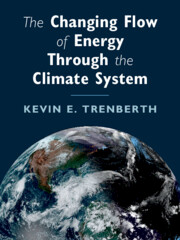Book contents
- The Changing Flow of Energy through the Climate System
- The Changing Flow of Energy through the Climate System
- Copyright page
- Contents
- Foreword
- Preface
- Acknowledgments
- 1 Earth and Climate System
- 2 Earth’s Energy Imbalance and Climate Change
- 3 Earth’s Energy Balance
- 4 The Sun–Earth System
- 5 Observations of Temperature, Moisture, Precipitation, and Radiation
- 6 The Climate System
- Flows of Energy
- 7 The Weather Machine
- 8 The Dynamic Ocean
- 9 Poleward Heat Transports by the Atmosphere and Ocean
- 10 The Changing Hydrological Cycle
- 11 Teleconnections and Patterns of Variability
- 12 El Niño
- 13 Feedbacks and Climate Sensitivity
- 14 Earth’s Energy Imbalance Estimates
- 15 Attribution and the Hiatus
- 16 Prediction and Projection
- 17 Emissions and Information
- 18 Climate Change and Environmental Issues
- Glossary
- Acronyms
- Bibliography
- Index
- References
13 - Feedbacks and Climate Sensitivity
from Flows of Energy
Published online by Cambridge University Press: 25 February 2022
- The Changing Flow of Energy through the Climate System
- The Changing Flow of Energy through the Climate System
- Copyright page
- Contents
- Foreword
- Preface
- Acknowledgments
- 1 Earth and Climate System
- 2 Earth’s Energy Imbalance and Climate Change
- 3 Earth’s Energy Balance
- 4 The Sun–Earth System
- 5 Observations of Temperature, Moisture, Precipitation, and Radiation
- 6 The Climate System
- Flows of Energy
- 7 The Weather Machine
- 8 The Dynamic Ocean
- 9 Poleward Heat Transports by the Atmosphere and Ocean
- 10 The Changing Hydrological Cycle
- 11 Teleconnections and Patterns of Variability
- 12 El Niño
- 13 Feedbacks and Climate Sensitivity
- 14 Earth’s Energy Imbalance Estimates
- 15 Attribution and the Hiatus
- 16 Prediction and Projection
- 17 Emissions and Information
- 18 Climate Change and Environmental Issues
- Glossary
- Acronyms
- Bibliography
- Index
- References
Summary
The climate is changing. The main reason is because of human-induced changes in atmospheric composition which produce warming from increased greenhouse gases. This is referred to as a forcing of the climate system. There are many other forcings, both natural and anthropogenic. The issue then is to determine the consequences in terms of the change in climate and its impacts. There is a direct response to just about any forcing, and in some cases that is the answer we seek. But in many or most cases, it is not so simple. Rather, the initial change provokes other responses, especially in the atmospheric and ocean circulation, that in turn cause other changes to occur. If the response amplifies the original change, then it is referred to as a positive feedback. Whereas if the response offsets and reduces the outcome, then it is a negative feedback. The size of some effects is quantified in Section 13.5.
- Type
- Chapter
- Information
- The Changing Flow of Energy Through the Climate System , pp. 197 - 209Publisher: Cambridge University PressPrint publication year: 2022



